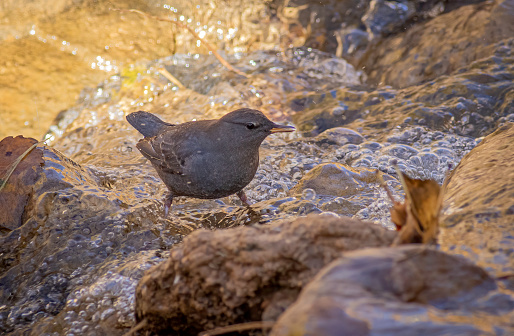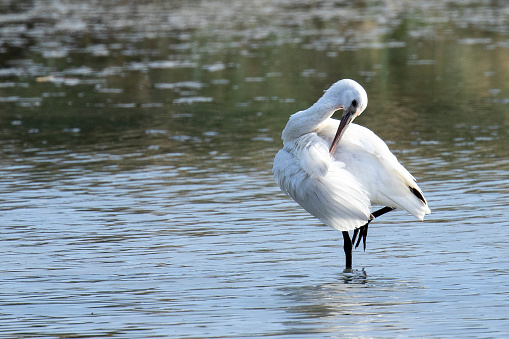An aquatic bird, also known as a water bird, is a species of bird that lives in or near water. These birds are adapted to eat marine food and can swim or dive in the water to survive. Ospreys, sea eagles, and other large birds of prey can take prey from the water, but they are not considered waterbirds. Water birds have webbed feet, webbed beaks and legs that can feed in water. They also have the ability to catch prey within the water. Here’s a list of the 10 most beautiful waterbirds in the world.
1.African Jacana
The African Jacana, a water bird that is most commonly found near the freshwater wetlands and perennial rivers of northern Namibia, is one of the most popular. With its long, slender legs that allow it to walk on water, the bird species is known as Jesus birds. Because it is often seen near waterlilies, the bird species is known as the lily-trotter. It searches for aquatic insects, larvae, and worms. They are excellent swimmers and divers, which helps them to avoid predators. The African Jacana has been seen flying for short distances, its wings bent and its legs extended. It can grow to 23-31 cm in length. Male species are approximately 137g and females about 260g.
2.Great cormorant
The Great cormorant can be found in open ocean environments, inland waters, and the areas of Europe, Asia and Australia. The Great cormorant’s long neck gives it a reptilian appearance and makes him a great fisherman. It can reach 70-102 cm in height and weighs between 2600-3700 gms. In the wild, the species lives for 23 years. Great cormorants are social birds. They are active throughout the day, and spend little time at roosts or foraging areas. It is a great predator and will eat many kinds of fish. When it is fishing in freshwater, it will also eat insects, amphibians, and crustaceans.
3.American dipper
American dippers can be found near rivers and streams, where they often “dip” their bodies up and down while searching for food. This medium-sized, grey-colored bird is known for its white eyelids. It can also have a dome-shaped nest that can hold more than a soccer ball. John Muir calls it water ouzels. It can grow to 18 cm in length and have a wingspan up to 23 cm. They can be found in the west, as well as Canada and Alaska. It can also be seen in Mexico, Central America, and Canada. This bird prefers unpolluted, rocky streams. Streams that have cliffs are good for growth and can be seen at elevations above 12,000 feet. It eats a variety of insects, including their larvae and eggs.
4.Baillon’s Crake
The Baillon’s Crane, also known as marsh crake, is a small waterbird of the family Rallidae. It can grow to 16-18 cm in height and is slightly larger than the little crake. The bird used its bill to catch food in water and mud, but it can also be seen. This bird species breeds in Europe, mostly in the east, but also across Asia. In the winter, the migratory bird travels to South Asia and East Africa. It was named after Louis Antoine Francois Baillon, a French naturalist. It produces a rattling sound similar to that of an edible frog or garganey.
5.Black-legged Kittiwake
One of the most beautiful waterbirds that belonged to the Gulls and Terns is the Black-legged Kittiwake. This bird species was found most of the year at sea. It was first identified by Carl Linnaeus, in 1758’s 10th edition Systema Naturae. He named it Larus tridactylus. Its name derives from its sound, “kitteewa-awake”, kitte-wa–awake, and Rissa, which comes from Rita, an Icelandic name for this bird. In North America, the bird is called black-legged Kittiwake to distinguish it from the red-legged. It is also known in Europe as kittiwake. This coastal bird can be found in the arctic and subarctic regions of the globe. It can be seen along the Atlantic coasts from Canada to Greenland, as well as the Pacific side from Alaska up to Siberia.
6.Crab Plover
Crab Plover, a bird related to waders, is part of the Dromadidae family. The bird species is believed to be closely related to Charadriiformes due to its thick-knees or pratincoles. However, it is possible that it could also be related to auks or gulls. Only member of the genus Dromaius. This bird species can be found in the Indian Ocean, where it feeds on small animals and crabs. There are nine colonies that contain Afro-Asian wading birds. The global Afro-Asian bird population is estimated to be between 60,000 and 80,000 birds. It can grow to 33 to 36 cm in length, and has a white head and plumage and a black marking on the back.
7.Double-crested Cormorants
The Double-crested Cormorant, a member the cormorant family, loves being near rivers and lakes. It can be found in North America from Alaska’s Aleutian Islands to Florida and Mexico. This bird species is a popular blackbird that can grow to 70-90 cm in length. It also has black and white feathers during the breeding season. There are 5 species of Double-crested Cormorants. They mainly eat fish and swim and dive to hunt. Rene Primevere Lesson first described it in 1831.
8.Eurasian Spoonbill
Eurasian Spoonbill, a large, long-legged bird that belongs to the Threskiornithidae family, is large and heavy. The bird species feeds by wading in shallow water and sweeping its partially open bill side to side. It is a fan of both salty and fresh water and will spend a lot of time feeding. It used to nest in trees and reed-beds with ibises or herons. Its bill is long and flat, which makes it easy to recognize. To allow it to breathe easier when in water, the nostra was relocated close to the bill’s base. Humans are aware of 6 Spoonbill species, and the bird species is monogamous.
9.Ferruginous Duck
The ferruginous duck, also called common white-eye or white pochard, is a medium-sized bird that is native to Eurosiberia. It is scientifically known as Aythya Nyroca, which comes from Greek Lithuania. This unidentified seabird was mentioned by Hesychius and Aristotle. The male species is distinguished by its rich, dark chestnut head and white details. This bird species is found in shallow freshwater bodies, and can be found in the areas of east to western Mongolia, south to Arabia and south to Saudi Arabia. It enjoys small fish, molluscs and aquatic insects.10.Glossy Ibis
Glossy Ibis, a waterbird that is part of the Threskiornithidae ibis-spoonbill family, is one of the members. Scientifically, it is called Plegadis falcinellus. This is a derived from Ancient Greek pleads. Its distinctive bill shape is what makes it unique. It is found in the warm regions of Europe and Asia, Africa, Australia, Australia, the Atlantic and Caribbean areas of the Americas. It is a good scavenger in shallow water. Glossy Ibis feeds on larval insects like aquatic beetles and damselflies, grasshoppers and crickets, flies or caddisflies as well as Annelida, including leeches and fish, amphibians and small snakes.




